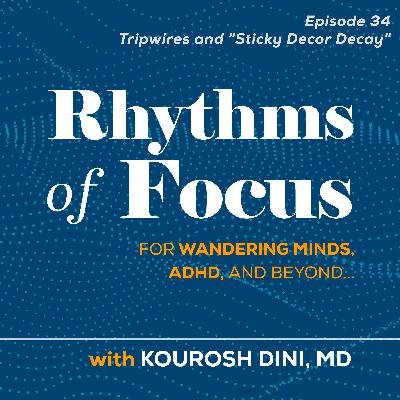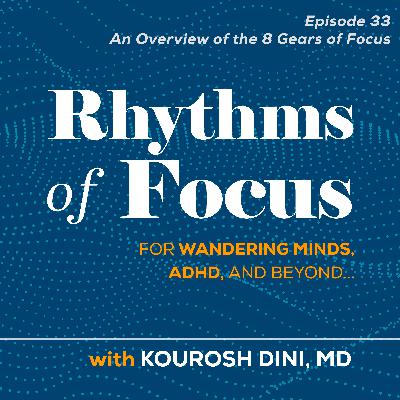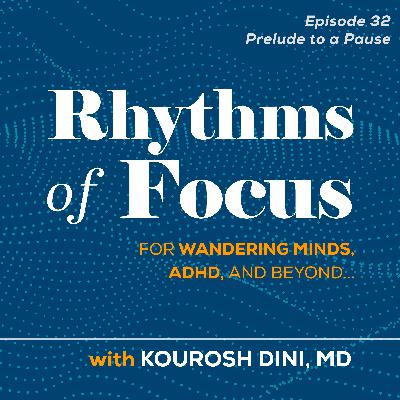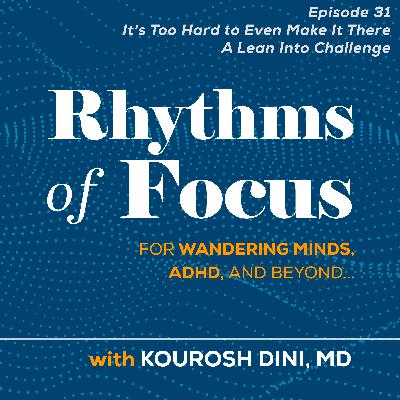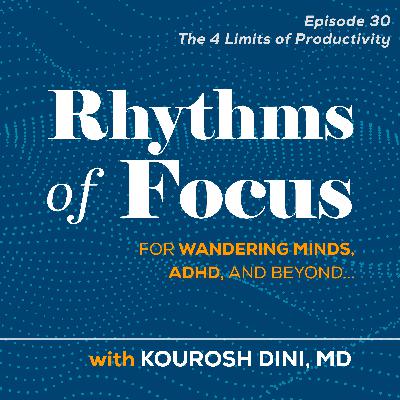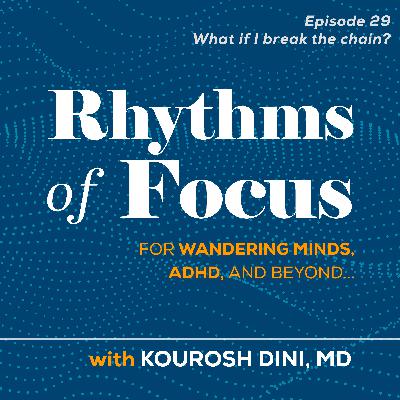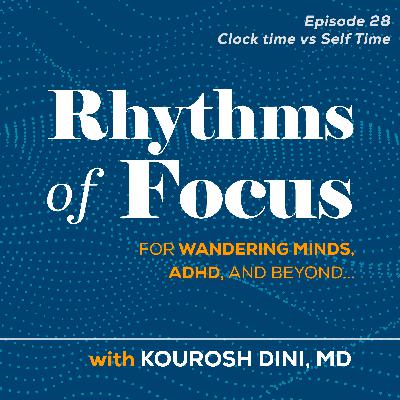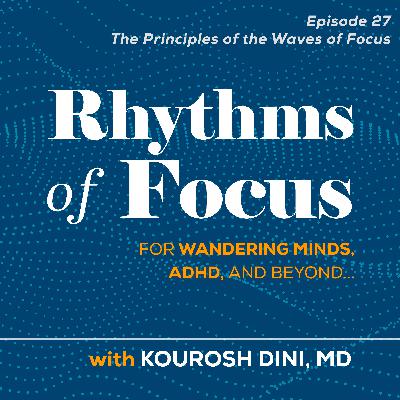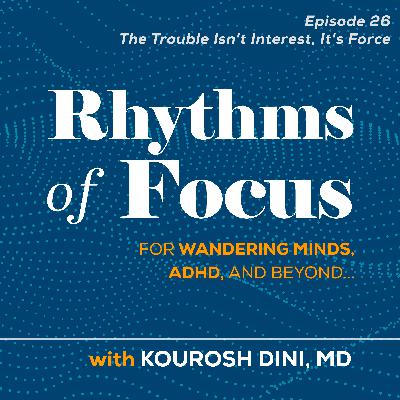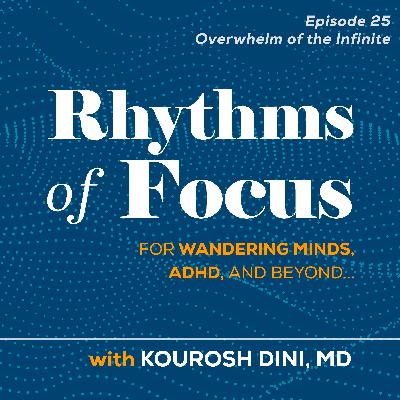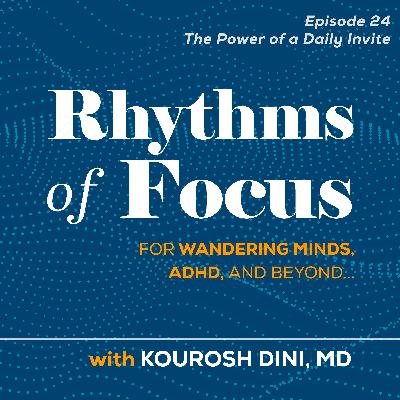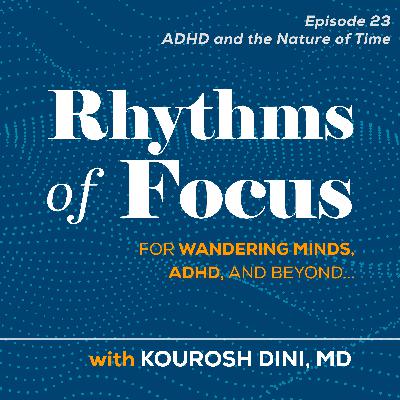Discover Rhythms of Focus
Rhythms of Focus

Rhythms of Focus
Author: Kourosh Dini
Subscribed: 5Played: 19Subscribe
Share
© Copyright 2026 Kourosh Dini
Description
Join psychiatrist, musician, and productivity strategist Dr. Kourosh Dini on a journey to transform your relationship with work, creativity, and focus. "Rhythms of Focus: for Wandering Minds, ADHD, and Beyond" explores the intersection of meaningful work and the art of engaging creativity and responsibility without force, particularly for wandering minds, ADHD, and beyond.
Each week, Dr. Dini weaves together insights from psychiatry, mindfulness practices, and creative experiences to help you develop your own path beyond productivity, and to mastery and meaningful work. Whether you're neurodivergent or simply seeking a more authentic approach to engaging the world, you'll discover practical strategies for:
- Building supportive environments that honor your unique way of thinking
- Transforming resistance into creative momentum
- Developing personalized workflows that actually stick
- Understanding and working with your mind's natural rhythms
Drawing from his experience as both a practicing psychiatrist and creative artist, Dr. Dini offers a compassionate perspective on productivity that goes beyond traditional time management techniques. You'll learn why typical productivity advice often falls short and how to craft approaches that genuinely resonate with your mind's natural tendencies.
Each week, Dr. Dini weaves together insights from psychiatry, mindfulness practices, and creative experiences to help you develop your own path beyond productivity, and to mastery and meaningful work. Whether you're neurodivergent or simply seeking a more authentic approach to engaging the world, you'll discover practical strategies for:
- Building supportive environments that honor your unique way of thinking
- Transforming resistance into creative momentum
- Developing personalized workflows that actually stick
- Understanding and working with your mind's natural rhythms
Drawing from his experience as both a practicing psychiatrist and creative artist, Dr. Dini offers a compassionate perspective on productivity that goes beyond traditional time management techniques. You'll learn why typical productivity advice often falls short and how to craft approaches that genuinely resonate with your mind's natural tendencies.
43 Episodes
Reverse
When every choice feels like too much—what to do, where to go, even what to eat—indecision can quietly drain our focus and energy. In this episode of Rhythms of Focus, we reflect on the psychology and mindfulness of decision-making for adults with ADHD and wandering minds. Together, we explore how to turn hesitation into awareness and uncertainty into creative flow.Listeners will discover practical ways to approach decisions with clarity and gentleness, learning how to work with their ADHD rhythms instead of against them. This is not about forcing productivity—it’s about developing mindful structure, emotional insight, and trust in our intuitive process.In this episode, we explore:• How emotions guide decision-making and shape focus for ADHD minds.• A mindfulness-based technique to ease decision fatigue and anxiety.• How to transform choices into creative, intentional acts of agency.The episode closes with an original piano composition, Icicle Drips, to help listeners ground in reflection and calm.For more, subscribe and visit rhythmsoffocus.com.#ADHD #WanderingMinds #MindfulFocus #ADHDMindfulness #DecisionFatigue #NeurodivergentCreativity #CreativeFocus #IntentionalLiving #ADHDWellness #MindfulProductivityTranscriptShould I or shouldn't I? What should I have for dinner? What if I did this or maybe I should do that. But if I do this, then what if it goes wrong? Well, if I don't decide, well, that's a decision too, isn't it?Decisions do weigh heavy, don't they? What gives?Matters of Great and Little ConcernThere's a quote I like that I got from, watching this movie called Ghost Dog. It's a Jim Jarmusch film, main character, quotes from the book Hagakure, the Book of the Samurai," Matters of great concern, should be treated lightly matters of small concern should be treated seriously."I dunno how well I follow that advice, but it is something curious.The Weight of DecisionsDecisions are in no way simple. Even the seemingly small ones, like deciding what to order at a restaurant, making small purchase, these can weigh us down into paralysis. Meanwhile, large ones like considering a change of professions, a move and more, these can plague us. They occupy the crevices of our every day, miring us in this anxieties, fears, regrets, and more.Sometimes we don't even realize we had a decision we could make until some regret form somewhere later, too little, too late. Or we leave them undecided as they create and sustain multiple waves and storms within us, worsening that scatter of a wandering mind.So decisions can certainly weigh heavy. When we decide, we cut, the word having the same Latin root as homicide, for example.We go this way and not any of the others. The universe of possibilities collapse into one.In fact, one piece of advice for decision leverages this, where we use a coin flip, not because we follow where it lands so much as we realize what's important to us. Something that we don't see or feel in our emotional landscapes until that coin is in the air. And this gives us a clue.Risk and Loss - Decisions and ConsciousnessEvery decision involves risk or loss. If it didn't, there wouldn't be a decision. We'd simply act. Consciousness itself may only exist for the reason of decision if we are to adopt a neuropsych analytic point of view. That even echoes William James from 1890 who had said "consciousness seems to arise only in response to a problem."It's like the brain doesn't call attention to itself until some system of pattern matching is off.We have tension, frustration, excitement, play care. Emotion- all of these cresting into thought as they brush into consciousness.Decisions rest on the sea of sensation, intention and emotion. Emotions connect into and through the deepest recesses of
This episode explores the complex nature of care and how especially those with ADHD can be caught in a vicious cycle of others feeling as though we don't care at all, or caring too much, to the point of being unable to take any steps to move forward.We address common feelings of being overwhelmed and questioning self-worth. The confusion that sometimes comes mistaking care with worry and highlighting the burdens that can bring.We delve into how care, when practiced skillfully, can help individuals better support themselves and others.The episode concludes with a relatable Reddit comment on simplifying life's purpose to care and an original musical piece titled 'Aging.'For more, subscribe and visit rhythmsoffocus.com.#ADHD #WanderingMinds #focusstrategies #neurodivergent #findingfocus #RhythmsofFocus #ADHDPodcastTranscript:I'm being pulled, every which way. I need to do the dishes, I need to do the laundry, I have to write the report - maybe I just need to rest.If I tell others I can't do this right now, they might tell me I don't care enough.Well, do I not care enough? How do I know if I'm being selfish?The Push/Pull of CaringIn our younger days, we may have turned in so-called sloppy work. Often some comment of not caring enough is applied somewhere along the way.Said enough times, we might wonder about this of ourselves. Maybe it's true.Wandering minds already have enough to struggle with. To stay on track we can create any number of guides, lists, markers, all these sorts of things that help us move forward.But in the meantime, even with these in helping us, we often have to pull ourselves back from one thing after another.We move into one thing, we get distracted. We dive deep into another, we might have to fight to pull ourselves out.It can be terribly exhausting, and yet there are still things to do.Wallowing in the Overwhelm of CaringDo we not have enough willpower? Or is it that we don't care enough?Even when we say, "I don't care," the fact that something entered our mind, even to negate it, means that something about it has our attention.In this way, caring is hardly some binary thing.What is care?What is it though? What is care?In one sense, well, it's an emotion. We can even point at it neuroanatomically: pathways and transmitters, dendritic connections and the like.We can also see it as an emotion in the sense of that which brushes into consciousness. Whether gently in barely perceptible waves or in crushing impossible storms.What I think is often missed in discussions about care is that it's more than an emotion. Beyond that, it is this spirit and practice.Harnessing the Power of CareCare flows through, and with, emotion. Emanating from meaning in the stories of our lives into that of perception, thought, action — at the very least.Often, care can be this wonderful spirit around which we can organize ourselves; doing the things that we feel to be helpful to those around us.Care involves a depth of attention on something.It's the spirit that nourishes, that creates the bed of intuition, that tempers and guides strength, the force of mystery of a force at all.We care in considering, when we rest our minds in some experience, our interests, our intentions attuning to what is.Ideally, we may even take our time. Find patience to reach some gentle acknowledgement where our decisions are deliberate. We can heighten that powerful measure of being. Agency itself.When we care for others, when we care for ourselves, when we care for the emotions of play and curiosity and discovery within ourselves.We can often fly on this feeling of mastery, meaningful work, and meaningful relationships.The Invisible Weight of CaringBut there can be a burden to caring. As a...
Miles Davis says, there is no such thing as a mistake. How can we understand the truth within this seemingly odd idea?We’ll explore how to gently reframe errors as part of our creative rhythm, not as failures that derail us. We'll consider how to distinguish between - an error (a deviation from our path), - a mistake (an unacknowledged error), and - a lesson (an acknowledged opportunity to learn). This episode features an original piano composition called *Enter* For more, subscribe and visit rhythmsoffocus.com.Hashtags #ADHD #WanderingMinds #MindfulProductivity #CreativeFlow #AgencyOverPerfection #ErrorAsLesson #RhythmsOfFocus #FocusWithoutForce #NeurodivergentCreativity #MistakesAreDataTranscript A jazz musician. Miles Davis once said, "don't fear mistakes. There are none." Now I might wonder if that would go for the pilot flying my plane, there's still a powerful depth of truth and beauty in the statement.Today's episode, I'll be reading a passage from my book, workflow Mastery about Error, mistake, and Lesson.And I hope you enjoy it. I make mistakes. I'm convinced that no one can avoid making mistakes despite the authority with which miles may make his claim.But there's a beauty and truth within that phrase. Do not fear mistakes. There are none.While I do not know for certain if "no mistakes" is applicable to every craft beyond art, its presence as a path in art is undeniable.The lesson as I understand it, is of learning and adapting to what is originally perceived as error so that it becomes a path towards mastery, even in the moments of improvisation.I imagine that at least some of this concept bears truth in all endeavors. We can distinguish the ideas, the concepts between error, mistake and lesson.An error is a perceived deviation from a path towards a vision.Deviations are influenced by whatever reality throws at us. Reality may include any object, including those external to ourselves or even meaning itself. If, for instance, we assume a meaning of something to be different than what it does mean, maybe by way of not seeing it's unconscious elements, then it's an error. On the other hand, we may discover some incompatibility between vision and reality. In setting the alarm clock for 6:00 AM to begin a 7:00 AM workday, we may have neglected to take into account the preparations for the morning and the commute amounting to 75 minutes of time.A mistake is an unacknowledged error.A lesson is an acknowledged opportunity to learn, such as an acknowledged error.So in this way, acknowledgement is precisely the difference between mistake and lesson. The degree to which an error is acknowledged in a depth of its details is the degree to which the lesson it provides may become useful.We may then decide for or against developing that lesson as an intention for learning.Acknowledgement allows an error to become a lesson. It brings an object's consideration to our sense of agency. We can then create the playgrounds, workspaces, habits, systems, and other means of organizing to effectively develop any intention based on this error, and we turn it into a lesson.In the case of the alarm, we may ignore it or chastise ourselves for being lazy or incapable of predicting time. We may instead decide it's meaningful to sleep and therefore make arrangements for an earlier time for bed. On the other hand, we may realize a much greater meaning found in a sense of irritation with the work itself, and that we've just unconsciously acted out against it.It becomes clear that errors may be viewed as not necessarily objects themselves so much as their misalignments between vision and reality.The degree to which we can acknowledge the discrepancies between vision and...
Caught between “I can’t start” and runaway hyperfocus, many of us feel like passengers in our own minds rather than pilots of our days. In this episode of Rhythms of Focus, we explore how wandering minds and ADHD can move from stuckness and self-blame toward genuine agency, ease, and purposeful action.We reflect on why “I don’t wanna” feelings are not failures of willpower but signals from our emotional world, and how redefining motivation can help us align emotion and intention without shame or force. We also walk through the Eight Gears of Focus, a gentle framework for moving from simple awareness into meaningful action, completion, and performance in a sustainable way.Listeners will learn:- How to see emotions as waves moving through awareness, rather than enemies to overpower. - How “force-based” productivity (shame, urgency, pressure) quietly erodes our sense of agency—and what to do instead. - How to use the Eight Gears of Focus to locate where flow is blocked and create kinder, more rhythmic next steps. This episode also features an original piano composition that mirrors the movement from hesitation into grounded focus, supporting a calmer nervous system as we listen. To stay with us on this journey of mindful productivity for wandering minds, subscribe and visit rhythmsoffocus.com for more resources and practice invitations.Hashtags #ADHD #WanderingMinds #MindfulProductivity #EmotionalRegulation #Hyperfocus #Agency #Motivation #Neurodivergent #PianoMeditation #RhythmsOfFocusTranscriptStuck Between Inaction and HyperfocusI cannot act. If I act, I'm in hyperfocus and my emotions. Well, they're dysregulated, as they say. Why are there so many problems? Where's the commonality between these? What can I do? ADHD, Wandering Minds, and the Question of Action I continue to search for some commonality, some simplicity that would explain the wandering mind. With ADHD, the central character in the coterie of wandering minds, it's useful to hear out the experts.Dr. Russell Barkley says, "ADHD is not a disorder of knowing what to do, it's a disorder of doing what you know at the right times and places."Is It Willpower, Free Will, or Something Else?What is it to not be able to act? Is it a lack of free will? The alignment of emotion and action are disrupted at the moments that would otherwise be meaningful to us? Sometimes we point at motivation. There's something can be said about this, but often that idea of motivation, this messy word can raise the cackles on the back of our collective necks, conjures the idea of willpower.Redefining Motivation for the ADHD BrainBut these depend on our definitions. I define motivation as the degree to which our emotions align with our intentions. One trouble, however, are these pesky, "I don't want our feelings," powerful and complex as they can be, and they don't align. So how do we align our emotions and our intentions?Defining EmotionWell, first, let's consider what emotions even are.Certainly there are multiple approaches from the spiritual to the practical, to the molecular and beyond. Rather than say what's right, I'm simply going to define it here, and now.Emotions are that which flows into consciousness, whether by brush or by storm.Essentially, whatever comes to mind. Is the cresting of an emotion.Perception as Emotion and the Role of ResonanceNow, this is a very different definition than what you're likely used to. Words, ideas, actions all crest into and through consciousness from emotion. What that means is that perception is also an emotion. Something outside of us resonates with something inside of us. If there was nothing within us with which to resonate, it wouldn't register. It would not reach conscious awareness.But as emotion arrives, we cannot argue with them. We might...
When we finally finish a project yet still feel behind, it is rarely about the checklist and almost always about our relationship with time, memory, and trust. In this episode of Rhythms of Focus, we explore how wandering minds and ADHD can turn “done” into “never enough,” and how we can gently reshape that story using an Honor Guide rather than another rigid system. We discover how time blindness, working memory limits, and fragile self-trust quietly fuel our endless to-do lists, and how a visit-based approach can restore a calmer rhythm to our days. We also walk through the three core parts of the Honor Guide—the Engaged, the Horizon, and the Steady—so we can build a meeting ground between our past, present, and future selves. - We clarify why finishing a project does not settle our nervous system and how to respond with agency instead of pressure. - We learn how to design an Honor Guide that protects our attention while still honoring our desires and energy. - We practice shifting from force and deadlines to gentle, daily visits that create sustainable momentum. This episode also features an original piano composition, “Spoken Speaking Spirit,” as a kind of emotional journaling and time-travel through music. If this resonates, we invite you to subscribe and visit rhythmsoffocus.com so we can keep cultivating these rhythms of focus together. ## Hashtags #ADHD #WanderingMinds #MindfulProductivity #HonorGuide #TimeBlindness #WorkingMemory #CreativeFocus #NeurodivergentFriendly #PianoMusic #RhythmsOfFocus Transcript> Whew. Finally finished a project. I can't believe it. I finished a project. Time to celebrate. Wait, there's the, oh, I gotta do that one thing first. Well, what about, what about that other thing? Oh my goodness, there, there's zillions of things I still need to do. How does anyone do anything?### Big Rocks, Hyper-Scheduling, and Endless To‑Do ListsOrganizing the day is not a simple matter. Some suggest setting up three "big rocks", these three large items that you wanna make sure you deal with today. Otherwise, all the little things take over, it can be a highly effective approach.Others suggest what's called hyper scheduling. It's a method of estimating a time for everything you need or want to do and scheduling every minute on your calendar. It's kind of similar to using a budget for money, but here with seconds, minutes, and hours.Others create long lists, infinitely long lists. They spend the day scanning that list, searching for something simultaneously easy, important within their energy levels and interest. And these things kind of pile up until the lists, toxicity levels break, and we start a new list.Well, any of these have their utility, but sometimes they also have their troubles. Even the simple three big rocks. In a recent episode of the rhythms of Focus, I described, uh, four limits to productivity, namely time, working, memory, agency, and trust.### Time Blindness, Working Memory, Agency, and TrustWandering minds in particular struggle with all of these. So-called Time Blindness, a constriction of working memory, an exhaustion of an injury to agency in which we say I don't wanna, and a lack of trust between the past, present, and future selves, such that sending messages between them is rife with strife.The waves of focus methodology includes a number of tools to help manage, and today, rather than go into so much of the, philosophical underpinnings of it. I just wanna describe what are the rudiments of what I call an honor guide.Introducing the Honor Guide – A Meeting Ground for Your SelvesThe honor guide is a meeting ground between the past, present, and future selves. It has a fairly simple...
When we sit down to read and realize we’ve “read the same paragraph four times,” it can feel like proof that we’re broken. In this episode of Rhythms of Focus, we explore a kinder, more rhythmic way for wandering minds and adults with ADHD to meet the page and actually feel alive in the words.### What we exploreWe look at why reading can feel like climbing a mountain, especially when working memory, emotions, and confusion fog the “now” of our attention. We also unpack what “active reading” really means for wandering minds and how we can use confusion, sleepiness, and resistance as gentle signals instead of verdicts against us.Together, we: • Reframe mind wandering and re-reading as part of the brain’s natural “formatting” process, not personal failure. • Practice questions like “What does this have to do with that?” and “What do we know, think, and not know?” to restore agency on the page. • Explore simple, environment-based supports (like single-path attention and fewer “infinite gravity pools”) that make sustained reading more possible for ADHD minds.This episode also features an original solo piano composition, “Alight,” inviting us to feel how staying alive in the notes mirrors staying alive in the sentences. If this resonates, we invite you to subscribe and visit rhythmsoffocus.com to keep traveling these gentler paths of agency, mindfulness, and rhythm together.## Hashtags #ADHD #WanderingMinds #mindfulproductivity #readingwithADHD #workingmemory #activeReading #neurodivergent #focusstrategies #gentleproductivity #RhythmsofFocus## Transcript “I’ve Read This Paragraph Four Times” – When Reading Feels ImpossibleI think I've read the same paragraph four times without absorbing a thing. How the heck do people read? 📍 Wandering Minds, Books, and the Mountain of Focus for some wandering minds, reading a book is about as difficult as climbing a mountain, mountaineers notwithstanding. Getting to the book at all is one hurdle, and staying with the book is yet another. We might blame that wandering mind, this sense I just can't focus, or maybe I'm not a visual learner well either, might be true.Interestingly, though, I've met quite a number of those with wandering minds who find reading delightful. This ready made path, easily followed without needing to hold back.The guardrails of the words and the passage lead them along this gripping story. Now, sometimes they might fall into other troubles like an attention tunnel hyperfocus. It's hard to break out of. While the troubles of being inflow are certainly important and worthy of our attention, I wanna focus today on the other side of matters, which is getting into the book.When a Book Feels Dead – Boredom, Assignments, and ResistanceThere's a sense of deadness, the words, the boredom. We could argue that sometimes a book just isn't very engaging. It's the book's fault, not mine. No, certainly that can be the case too, but I would just say, okay, we'll find another. And then you're saying I'm assigned this one. Well, okay. Okay. I give up.Let's see what we can do, anyway. Chapter 4: Single-Path Attention – Why Planes (and No Wi‑Fi) Help Us ReadThere are any number of approaches we can take. In recent episode I describe being on a plane with a book without wifi. We're able to allow our mind to wander about, as opposed to having the internet, hobbies, or other infinite gravity pools pulling, we have the singular path forward for our attention.Cracking open the book, we can weave back and forth between being and engaging a word here, a sentence there. And sometimes we can even dive deep pretty...
When a language app starts running your day instead of helping you learn, something vital is off. In this episode of Rhythms of Focus, we explore what really helps a wandering mind learn—and where streaks, scores, and mascots quietly get in the way.We look at why traditional metrics like lesson completion and streak counts so often backfire for adults with ADHD and wandering minds. We then explore how to shift from checkbox-driven learning into a more playful, embodied relationship with language, work, and creative practice. Along the way, we rethink what it means to “make progress” when our real goal is connection, not just completion. • Redefine success with measures that actually matter to you, like having a warm, real conversation instead of just hitting 80% on a quiz. • Bring play, feeling, and immersion back into your learning so that words—and work—start to flow instead of fight you. • Use milestones as gentle trellises rather than rigid rulers, so your attention can grow in its own, more natural rhythm.This episode also features an original piano composition, “Petty Walk,” a title born from a happy mistake that became its own small act of creative discovery.If this resonates, we’d love for you to subscribe and visit rhythmsoffocus.com to continue exploring calmer, more humane rhythms of focus.Transcript Okay, so if I get 10 in a row, correct, complete the next two lessons and score 80%. Three times I'll be done with studying Spanish today. Wait, how long have I been using this app and why can't they speak Spanish yet? If I can speak a single sentence in Spanish without my Cuban mother-in-law looking at me funny, I'll consider it a success. Other reasons for the funny looks notwithstanding.Meanwhile, I've been using this language app for years now, and I continue to struggle.Curiously on various forums and subreddits, i've read similar concerns.Hey, this app is no good. I haven't learned the language yet!The Real Problem Isn’t the App – It’s How We Measure ProgressI don't believe though that the trouble was the app. Certainly it's not the be all, end all of education. It is crafted quite well, presents things very nicely, and I speak and understand a heck of a lot better than I did before using it.So what's the trouble?When Metrics Backfire – Goodhart’s Law in Everyday LearningThe trouble's, the measure. In studying and work and whatever endeavor we engage in, we'd like to have a way to step forward. Complete this. Do that move from here to there. Whatever it is, some measurement comes into play.The trouble with measuring, though, is how it can disrupt and sometimes even destroy the very thing we are trying to measure. There's a lovely quote, also known as Goodhart's Law, which says, "when a measure becomes a target, it ceases to be a good measure."I would even argue that most of what is meaningful cannot be measured, whether that's about an idea, a diagnosis, a set of symptoms.But because completion, time, characteristics, these can be measured, they become our default. Whether in learning and communications and our business transactions, we often function through measures.How much did this make? How much did you do? When will it be done?Checkboxes, Burnout, and the Death of Meaning at WorkMeasurements are not bad, but they are tools, and the more powerful the tool, the more caution it requires. When we're not cautious, we don't recognize the potential negative effects, we do so at our own peril. In fact, it may even be abused.For example, what happens at work when we only check the boxes but do nothing else? We could argue, well, we're getting the work done. What's missing is the spirit, the sense of meaning, what builds from vision and life into a living result, whether product, service, or simply being...
In today’s episode of Rhythms of Focus, we how motivation can seem to slip away when someone else's "should" enters the equation.Why do wandering minds rebel against orders? How does honoring our unique mental rhythms restore our sense of agency, especially when ADHD shapes our day to day.Takeaways:Recognize the subtle ways internalized authority undermines our drive—and how to gently reclaim itPractice strategies for honoring our past, present, and future selves to smooth task transitionsReframe lists and routines as creative allies rather than rigid overseersThis episode features our original contemplative piano piece, “Shallow Breath,” designed to accompany your mindful moments.Subscribe and join our compassionate community at rhythmsoffocus.com—let’s transform productivity into an art, not a struggle.Hashtags #ADHD #WanderingMinds #Agency #MindfulProductivity #Neurodivergent #FocusStrategies #SelfCompassion #CreativeProductivity #TaskTransitions #RhythmsOfFocusTranscriptTranscript I might just might do the dishes now. Oh my goodness, I'm getting up. I'm walking over to the dishes. I'm gonna do it.Suddenly a voice calls from the other room. Hey, you haven't done the dishes in a while. When are you gonna do them?Uh, I don't feel like doing them anymore. What just happened? Sometimes we're right about to do a thing with our own volition. And somebody else suddenly says, Hey, go do the thing, and suddenly our desire to do it is gone. Our sense of agency was, in a sense, attacked wittingly or otherwise. Our hero already struggling with a want of motivation. Whim, or the muse finally had the winds tickling the sails.When someone else told them to do the very same thing, the desire was gone. Many of us struggle with being told what to do.Some blame dopamine. There's not enough. It's outta balance. It isn't interesting or urgent enough. Some make a moral accusation of laziness and the like.However, when we approach from perspective our ourselves as growing human beings, you might recognize an early template at work. When our environments tell us what to do in this out of tune manner, in some way that doesn't quite recognize where we are, we might reject it.Clean your room when our minds are elsewhere. When any process of transition is ignored rather than guided, doesn't work, it often creates problems.The lack of empathy may not have been malicious. It was simply a disengaged approach to a mind that wanders, a mind fueled by, and reveling in play, creativity and discovery.It may not even have been possible. The transition simply too long in whatever the scope of what needed to happen.But when these things happen over and over, we absorb this message that our natural mental rhythms are somehow wrong, contrasting with the self that clearly exists, regardless of how wrong we accuse it of being and so we rebel.Unfortunately, we may internalize the rebellion as well, forming a form of reflex, an unconscious ready path of rejection. We rebel against ourselves. The authority within.How often have you written, write report, or some similar item on a task list? Only to see it later and then say, well, "not now."Later. Continues to be later, as later always does, and the task languishes until it sinks below the surface or a deadline threatens from the horizon. We saw our past self as this unempathic authority to reject. When we see the task "do dishes" and the like, our emotions swell reflecting the relationships we've internalized.Without a simultaneous honoring of our past self, caring for our future selves and respect for our present self, we channel and perpetuate the injuries. Our tasks, lists, and shiny new apps only become the medium.Music - "Shallow Breath" Today's piece of music is a quiet, contemplative...
In this episode of 'Rhythms of Focus,' listeners explore the concept of 'trip wires' as a tool for mindfulness and task management. Discover how to set effective reminders for your future self and understand the phenomenon of 'Sticky Decor Decay,' where unaddressed reminders blend into the background over time. Learn actionable strategies to prevent task overwhelm and ensure your reminders stay effective. Plus, enjoy an original piano composition titled 'Humming the End' that underscores the episode's themes. Subscribe and visit rhythmsoffocus.com for more insights tailored for adults with wandering minds and ADHD.00:00 Sticky Decor Decay01:37 The Need to Store Intentions01:58 Trip Wires03:47 "Sticky Decor Decay"05:24 SDD as a List06:19 An Equation Makes Science!?Hashtags #ADHD #WanderingMinds #MindfulProductivity #FocusHabits #CreativeAgency #Intentions #SelfCompassion #Neurodivergent #RhythmsOfFocus #PianoMeditationTranscript I gotta do this and I gotta do that. You know what, I'll just leave this thing over here. Yeah, I'll leave this here to remind myself.Three months go by.What the heck is this doing here? The Need to Store IntentionsWe can't do everything at the same time. The options are many, but the actions need to be singular. We need to take out the garbage, but something just fell to the floor. We need to remember to move a thing to the garage, but right now we're doing the dishes. We need to buy stuff from the store, but right now we're not going to the store.Trip WiresOne means of managing this is to use a trip wire. What do I mean by a trip wire? Well, a tripwire is a reminder that we set for our future selves. We have some intention now that we're not done with, we'd like to get to, and so we ask our future self,"Hey, can you pick this up for me?"The hope is that future self will then see, hear, feel somehow experience this reminder, then pick up that thing and follow through while our present self does whatever else.We do this all the time. Maybe we put a grocery list on a sticky note by the door, so we see it as we leave the house. Maybe we leave that book by the nightstand to remind ourselves to read it. Maybe we'll leave a vacuum cleaner out in the morning before leaving to work, to remind ourselves, perhaps optimistically, to vacuum later in the afternoon.The hope is that we'd be reminded about a thing and then do something in that moment.This can be a viable strategy. That does apply a certain pressure on our future selves and that they need to not only receive that information, but also then act in that moment acting in a way that aligns with present self, including managing those "I don't wanna feelings" when they receive it. Even so it's still not the whole picture. For example, I prepared sandwiches for myself for lunch later in the day, only to leave them on the kitchen table, unrefrigerated, only realized when lunch rolls around.I partially solved the problem with a trip wire by putting it in a plastic bag and hanging it on the doorknob. But then again, sometimes I still forget. I walk through the door, seemingly only mildly annoyed that there's something hanging on the doorknob, as I walk out,"I have places to go, things on my mind. That thing in the doorknob, well, I'll deal with that later." "Sticky Decor Decay"The funny thing about trip wires is that when we don't act on them, they decay. It's not just sandwiches, it's anything. In fact, I've come up with this phrase that's kind of fun to say. It's called "Sticky Decor Decay." Sticky Decor Decay.It has zero basis in any scientific rigor whatsoever, but I wonder if it might resonate with you, and I'm trying to come up with an equation to describe this. Maybe one that you, dear listeners can help me out with. So if you come up
Discover eight distinct “gears” of focus—stages we moves through, from simply being, to considering, approaching, and ultimately performing at our best. Honoring each gear transforms frustration and procrastination into creative flow and agency. Drawing parallels to music, emotional waves, and mindful play, this episode invites listeners to see hard work not as a battle, but as a dance with emotion, context, and self-compassion.Learn to recognize and move through all eight "gears" of focus, from daydreaming to performingEvery episode features an original piano composition—this time, enjoy “On a Dare” in C minor. Subscribe and find more mindful productivity resources at rhythmsoffocus.com—because your rhythm matters more than rigid rules.Hashtags#ADHD #WanderingMinds #MindfulProductivity #FocusStrategies #Agency #Creativity #EmotionalWaves #RhythmNotRules #GentleSelfMastery #PianoAndFocusTranscript Sometimes we could just fall right into a project, pick it up, and bam, we're in it. Even when we hit a bump here and there, we can make it through sailing. Other times, sometimes even with the same project, just on some other day, a sense of revulsion can just emanate from it.Or maybe we barely consider, it doesn't even come to mind, or maybe we start to ruminate about it. Keeps coming to mind and we think, Ugh, I really have to figure that one out. Meanwhile, the deadline creeps along until it crosses that threshold where we finally kick into gear. In either case, whether we're enjoying something or we're trying to avoid it, we go through many of the same steps, and when we know them, we can start to more deliberately take on the things that are difficult or have that, "I don't wanna" cloud around it. I in fact, count eight different gears in which we can engage something, what I call eight gears of focus.In a Plane with a BookHave you ever been on an airplane or some enclosed space? Where you didn't have wifi or minimal distractions, but you do have a book. I imagine somewhere in your life you've been in something of the situation. What happened?You may well have started to read. Not only that may have even started to get into it and then wondered,Why can't I always do this?Somewhere in here you might think you were forced to read 'cause that's all you could do, but I'd suggest that's not really what's happening. In fact, what's happening is that we're supported by the zeroth gear of focus.There are eight gears of focus that I count starting with this zeroth gear.When we're good at something, we naturally move back and forth through these gears. Shifting is needed without even thinking about it. Sometimes we support them, sometimes we ignore them and get into a lot of trouble. It's when we get into difficult matters where things really throw us off.We lose sight of these gears, or we don't even feel them as we naturally progress through them. And that's where we can get into a lot of trouble, like habits that don't take hold and projects that are never followed through.So today I thought I'd outline these gears.They're, uh, an important part of the waves of focus course that I've put together for those with wandering minds, ADHD, and beyond. But I think we go through all of these gears, regardless of neurology. See I have this theory that hard work is emotional work. Complex work requires the management of overwhelm. Even physically threatening work like being a firefighter requires the management of fear. Logic itself is a flow of play through seeking and understanding.Emotion, and at least the definition I use is that which crests into consciousness, whether by caress or crash.Our focus is our means of choosing and riding one or some set of these emotional waves that are currently brushing into the hull of conscious awareness. And as these waves continue to
In this episode of "Rhythms of Focus," we consider distraction and stimulation. When our minds wander and the pull of the phone grows strong, we search for stimulation is actually a longing for real meaning and energy in what we do.Explore how our emotions shape the way we focus and why boredom so often pushes us toward escape. In pausing—noticing our feelings instead of avoiding them—we can find agency. Mindfully, we practice shifting from reactivity to a state where we can choose what feels truly right for each of us.Takeaways from this episode:Recognize what fuels the urge to distract ourselves and how to address it with understandingLearn a practical technique for pausing and noticing emotions to unlock a new sense of agencyDiscover how awareness can transform moments of discomfort into opportunities for meaningful actionThis episode features our original piano piece, “Prelude to an End,” to help anchor these reflections and support our mindful rhythm.Subscribe for more supportive conversations, and visit rhythmsoffocus.com to deepen your journey with us.Hashtags #ADHD #WanderingMinds #MindfulProductivity #Agency #EmotionalResilience #Creativity #FocusChallenges #Neurodivergent #IntentionalLiving #PianoMusic Trancript "What if I did my weekly review? Oh, but I just gotta write that report. I'm a nails need clipping. I would rather go and do that. No. How about if I just, uh, yeah. Hopeless. But I think I just need a reset. Let's see what's on Instagram here."Three hours go by."Where did the day go? Oh my goodness, I had so much to do." Getting lost in the day. The media politics, both grand and in the family, it's far too easy to lose our bearings. We might blame this sense in ourselves that we need stimulation. Whatever it is we're "supposed to do" is simply not stimulating enough. Might be quite boring, in fact, but what is that craving for stimulation?The word itself is so bland.We might say, well, I need something that's shiny or on fire as a client of mine would say. But even these are not enough to describe what this is.Stimulation, is this stand-in for a sense of vitality. We want to feel alive, some depth of meaning growing somewhere within us. All right, so how is that related to this infinite scrolling on our phones? Well, any number of emotions get touched off. Humor connects because it draws attention to something we haven't considered. Some surprise and discovery, some edge of society. Fear connects because it tells us to look over here at the risk of peril. Sex connects because the creative spirit in lust is just that powerful, this massive momentum carrying us through the ages.All of these emotions connect to some sense of meaning within ourselves.So how can a report possibly compete? We need stimulation again because we need something to feel real.Alright, so what the heck does this have to do with any form of productivity in whatever shape or form? Well, when we can acknowledge that the so-called need for stimulation is more truly about some need to feel alive, we can find a new direction.For example, let's say we're able in some rare moment to catch ourselves scrolling through the phone, wonder to ourselves, well, what am I doing? The initial impulse might be to say, how do I avoid this? How do I get out of this phone?Well, I'll try to do nothing. Well, that rarely works. Nature of which our minds are apart abhors a vacuum. That phone is easily reached for once again, the unconscious forces are powerful, much more so than that blip of consciousness with which we sail our lives and we ignore that power at our own peril.It's all too easy to just find ourselves in the phone, not realizing we were there. Another impulse might be,I'll try to do something. Anything else!Sometimes...
Feeling stuck—where even the simplest task feels too heavy to lift? In this episode, instead of chasing rigid productivity, listeners will discover the subtle art of finding ease within challenge, tuning into the rhythms of play, and learning how to gently move forward even when motivation wanes.Listeners will learn:How play, frustration, and challenge intertwine, illuminating gentler ways forwardPractical methods to surface and honor emotions that hinder focus, catalyzing growth through compassionTakeaways:Pause to reflect deeply before acting, creating space for authentic decisionsShrink tasks down to their smallest steps, inviting ease rather than pressureChannel rhythms of natural play into even the most stubborn work momentsThis episode features a performance of Scott Joplin's Maple Leaf Rag. Subscribe and join our growing community at rhythmsoffocus.com—where wandering minds thrive along waves of agency and creativity.Keywords#ADHD #WanderingMinds #Agency #Mindfulness #GentleProductivity #PlayfulFocus #EmotionalEase #CreativeFlow #CompassionateGrowth #MicroActionsTranscript All right. Let's see what I've got on my list here to do today. All right. Uh, visit the gym. Are you kidding me? Sometimes the simplest things can feel like the heaviest weights. The simpler they are, the more paradoxically we "can't be bothered."Head to the garage, show up to the dishes, open the report- all of these can come with a wave of revulsion.How could we ever move forward?I often and continue to espouse a "visit" as a powerful unit of work. This idea of showing up to something or bringing it to ourselves and staying there for one single deep breath, and then making a decision as to what we wanna do, whether walk away or into the work.It is a powerful unit of work, but even so, it might still be too difficult to make it there, even with this idea of not having to do a thing.What then? I imagine there have been times that you've been here. Maybe someone kept bugging you, maybe a due date crept along far enough, or just yelled at yourself into this sort of painful, "just start" and you finally started going.But there are gentler paths and you may well have done those too.Take for example, how we already act when we are in play. When we enjoy something naturally, we might bump into frustrations, take stock of where we are, slow down, break things down, simplify things, find some ease once again, and finally return with that ease back into challenge. Dynamically, we tune to the windows of challenge for where we are in that moment.We find those places that are not so easy to be boring and not so intense as to be overwhelming.We can adapt the same process to difficult work, hard work, something we can also call emotional work, only by bringing the process to consciousness. The first and perhaps most important step is to pause, where we reflect without reacting, where we can connect to that deeper sense of self. It gives us that space to decide:" Maybe this isn't even a thing that is meaningful for me at all."But if we do decide to move forward. We can also sense in that pause where we rest in those emotions that we discover something hidden in the words that we've been using. The sort of, "I just don't wanna" sort of phrase, we might be saying to ourselves, we can discover this deep, complex, emotional world beneath those words.In that pause, we might see one such emotion that's contributing that of let's say, exhaustion. This consequence of repeated hits to our sense of agency, dropping, losing, forgetting things. We lose the sense of capability. Any attempt risks yet another injury as a fear of true inability would rear its ugly head in these clouds, choking us into collapse.Fully engaging these emotions, maybe even...
Discover why your latest app or productivity hack is not the real hero—or the real challenge. In this episode of "Rhythms of Focus," we explore what truly lies beneath those endless quests for the perfect system, shining a compassionate light on wandering minds and ADHD.Listeners will uncover how recognizing and respecting four key limits—time, agency, working memory, and trust—is far more liberating than forcing themselves into rigid molds. Instead of battling against limitations, you’ll learn to use them as anchors for meaningful work and creative rhythm. This episode unpacks the seductive promise of productivity systems, the artistry of aligning attention with intention, and gentle strategies to transform overwhelm into empowered agency.Key takeaways:Honor time, agency, working memory, and trust as necessary boundaries that support creative flow.Replace shame and frustration with self-compassion—embracing playful mastery over strict discipline.Discover actionable ways to build a trusted, resilient productivity environment that fits a wandering mind.As always, enjoy an original piano composition woven into today’s episode, designed to nurture calm and focus.If this resonates, subscribe and visit rhythmsoffocus.com for more insights, resources, and episodes to help your unique rhythm thrive.Hashtags #ADHD #WanderingMinds #Agency #MindfulProductivity #FocusRhythms #CreativeFlow #WorkWithLimits #SelfCompassion #AttentionMastery #OriginalMusic TranscriptWhy won't the system work?! I found a new productivity app, let me tell you about, it's the greatest thing ever. Oh, did you hear about that productivity book by Mr. Awesome Sauce. It's the greatest thing ever. Fast forward two months, uh, another system down the drain. I can't do any of these.Maybe there's just something wrong with me. I can't seem to make any of these work. What's going on? I what? What if it's not the app? What if it's not the book? What if it's not ourselves? All right, where is it then? Maybe it's in something we still need to acknowledge the limits.Seduction of an AppThe promises of some productivity system can be powerfully seductive.The idea is that we'd get more done with less effort. Stay on top of it all. Everything's organized. Everything shows up exactly where we need it. Heck, I do have a system myself and I think it's pretty darn awesome. Lemme tell you, it's all shiny and new, but that may well crash too.Pushing Limits We often push limits.It's important to push limits. Play, this depth and breadth of flow between self and world discovery, question and tension- it's a vitality that once it finds root can be such an inspirational flow. The sap of mastery and meaningful work and relationships. We see it in the toddler in their focus while they're stacking blocks and we see it in the craft's master that has that same focus as they're in that deep reverie.Play pushes limits. We tend to think of limits as somehow enemies, or perhaps they're ever present challenges that must be dominated, broken through, if not destroyed.And we can see that as well between the toddler and the adult.Supportive EnvironmentsTo reach that place of being able to stack blocks, we have a sense that our environment can hold us, that it won't interrupt us without care or reason.That's somehow takes us and our being hood into account. Maybe we push one way or the other. We try to wander this way or that. But time and again, in ways we know and in many ways we don't, perhaps only feeling it as this gentle wave from some distant shore, we are supported, in being here and now.The craftsperson similarly has done the work themselves of establishing those things, the environment, whether appearing to be a chaotic mess or this pristine lining of tools and resources. Somehow...
Break free from the tyranny of the unbroken streak—what if focus meant something deeper than chasing another checkmark? This episode of Rhythms of Focus invites wandering minds and adults with ADHD to let go of the pressure to “never miss a day,” discovering a kinder, rhythm-based approach to meaningful growth.In this episode, explore:- Why the “Don’t Break the Chain” habit method can create more anxiety and shame than mastery.- How shifting from scorekeeping to presence transforms habit-building from a rigid tally into a playful, mindful journey.- Practical strategies to reframe loss and missed days as part of life’s natural ebb and flow—fostering agency rather than guiltKey takeaways:- Learn why focusing on experience rather than streaks fosters real mastery and self-compassion.- Discover the three-part Daily Invite: decide, be, and act—without the weight of perfection.- Begin to view your habits as musical rhythms, not broken chains—open to improvisation, pauses, and creative renewal.This episode features an original piano composition, “Ascend,” reflecting the dance between struggle and growth. Subscribe for more gentle, empowering strategies, and visit rhythmsoffocus.com for resources tailored to creative, neurodivergent thinkers.### Hashtags:#ADHD #WanderingMinds #FocusRhythms #MindfulProductivity #GentleHabits #SelfCompassion #DailyInvite #CreativeGrowth #Agency #NeurodiversityMentioned in this episode:Join the Weekly Wind Down NewsletterThe Weekly Wind Down is an exploration of wandering minds, task and time management, and more importantly, how we find calmer focus and meaningful work.
A short little poemMentioned in this episode:Rhythms of Focus - CTA - Subscribe, Rate, and Review
Uncover a revolutionary approach to managing ADHD and wandering minds in this episode of 'Rhythms of Focus.' Discover the 'Waves of Focus,' a comprehensive guide designed to transition you from force-based productivity to trust-based agency. Delve into key concepts such as the anchor, visit, and visit guide. Understand how to create a meaningful, rhythm-oriented life framework that enhances agency and mindfulness. - Key Takeaways: - Learn to transition from force-based to trust-based productivity. - Discover tools and techniques like the anchor and visit guide. - Understand how to create meaningful rhythms and improve your sense of agency.Subscribe to 'Rhythms of Focus' and visit rhythmsoffocus.com. ### Links- [Crocodile and Cube: In the Studio](https://www.youtube.com/playlist?list=PLaRbIj8RyZIaLGCiP4DYnPBsTbKuSj1Nw)- [Episode 4](https://rhythms-of-focus.captivate.fm/episode/from-force-to-flow-with-a-visit/)- [Episode 9](https://rhythms-of-focus.captivate.fm/episode/i-dont-wanna-and-the-practice-of-agency/)- [Episode 14](https://rhythms-of-focus.captivate.fm/episode/the-magnified-mind/)### Keywords #WavesofFocus #Agency #Mindfulness #RhythmsOfFocus #Tools #ADHD #WanderingMinds #TrustBasedProductivity #AnchorTechnique #VisitGuide00:00 The Principles of the Waves of Focus03:36 What are the Waves of Focus?03:47 One - a Goal04:30 Second - a Philosophy06:19 Three - a Metaphor08:01 Four - A Set of Tools09:29 Five - A Framework12:25 Six - A Set of Rhythms14:55 Seven - a Practice15:26 Final Thoughts15:59 Music - "The Dust Cleared"Transcript How do we approach challenge? Sometimes we turn away, sometimes we dive in, sometimes we sidle up next to it. Gently stir the water with a big toe slip our legs in, sit with our feet dangling as we look across the pond and wonder. So I put a challenge before myself here now. It's about trying to explain my life's work, this Waves of Focus.A guide for those with wandering minds, ADHD, and beyond. This course that I've put together, and I wanna be able to describe it in as short and simple as possible in this episode today. How the heck am I gonna do that? When you live and breathe something, it can become difficult to say what it's about to someone who doesn't live and breathe that same thing.Sometimes we simply have a vision in our head. It could be a vision of a deck. We're trying to build a memory that came to mind from something that was said, an interesting idea about a story.Whatever it is, it's hard to explain it, and sometimes it's even hard to explain to ourselves.There's this hilarious set of YouTube videos called Crocodile and Cube. I'll link to it in the show notes. In which there's this one character, where he, hears something in his mind, this music, and he wants to create it.And there's this other person that he's working with and they're trying to make sense of it. They're saying, okay, one person tells the story of what they want to hear. The other person tries to put it together, and together they try to bring this out into the world. It's a wonderful metaphor for the parts that can live within ourselves, even.And wandering minds tend to connect with a depth of experience, a reality that feels alive. Words can feel hollow and brittle at times, unless they're really backed up by that sense of reality within them. How do we translate these ideas, these images, these somethings within our mind, into words, into images we can describe to others. and to anything?But somehow we do. Artists, authors, creators, we all practice, define, refine over time, and eventually we come up with maybe not just a single story, but. Many...
Ever feel lost at the starting line, waiting for motivation or urgency to nudge you into action? In this episode of Rhythms of Focus, we break through the myth that productivity is just about interest or deadlines and instead explore the deeper role of trust—trust in oneself, in emotions, and in the gentle rhythms of daily life. Discover how acknowledging your questions and fears can open the door to meaningful engagement rather than forceful productivity. Learn to nurture agency as you’d cultivate a delicate plant—growing your ability gently, with care and play, instead of harsh deadlines or rigid routines.Key TakeawaysPractice pausing with kindness to heal the injured trust beneath procrastination and overwhelm.Embrace agency as the starting point for guided growth, letting agency serve as your compass in emotional storms.Replace forceful tactics with playful, mindful rituals that support reliable starts and creative fulfillment.Enjoy this episode’s original piano composition, "Snow," weaving gentle three-four rhythms in C minor—a musical reflection of trust and play in motion.Subscribe now and visit rhythmsoffocus.com for more tools to nurture your wandering mind.Keywords: #ADHD #WanderingMinds #agency #mindfulness #gentleproductivity #trustyourself #creativegrowth #emotionalresilience #playfulfocus #RhythmsOfFocusTranscriptI just can't get started. Oh, but once I can, I'm good to go. It's a familiar refrain from many a wandering mind. Sometimes we work strong. The stars align whether by deadline or unknown, stumble, spark of novelty. Somehow we find ourselves in a deep dive.In the immortal words of the Talking Heads, David Byrne, you may ask yourself, well, how did I get here? Trust over InterestToo often we say it's all about interest or urgency, something shiny or on fire. We throw up our hands and say, "without these we can't do anything."But there's so much more going on than simply interest. Interest, after all, is a deeply complex emotion. In fact, it may be more about an injured sense of trust within ourselves.The word "trust" itself might seem boring. We hear it so often, seems to have lost all meaning. I've said it before, but I'll say it again.Trust is a sense of feeling that something will continue to behave as it has been, such that it might be relied upon.It is a vital, vital concept that creates structure. Even words themselves. Our words exist because we feel that they will continue to behave as they have been within the ecology of the worlds in which we live inside and out.What do I mean by trust when it comes to play and work?A Few ExamplesWell, let's take an example. Let's say you see someone schedule themselves to do a thing from four to 5:00 PM. Four o'clock comes around, they sit down and they do it. What's the magic? It doesn't seem like we can do that. What happens if we don't feel like it? The feeling of even "feeling like it" is deeply complex.Wandering minds often face multiple worries each, and evidence of the loss of trust in ourselves.For example, let's say we try to set something at four o'clock and we might wonder a whole series of questions:how am I gonna feel when that time comes? What will I be in the middle of? Would I be able to stop if I got started? Would I be able to get back if I need to set it aside? Would I even know what to do if I started? And what if I don't? What if other things come up while I'm working? Will I even realize it? Would I miss yet another important matter? What if I run off on a thousand tangents in the meantime? And many other possibilities...Now, this is just about a thing at four o'clock. There's many other types of work, not to mention, balancing various things that we've got going on in our lives. Each of these questions have fears within...
Feeling swallowed by the waves of overwhelm? In this episode of “Rhythms of Focus,” Kourosh Dini invites listeners on a gentle voyage through the tumultuous sea of starting something new—whether it’s a project, a piece of music, or simply the next small step on the creative path. Rather than pushing for rigid productivity, Kourosh explores the art of recognizing emotions, honoring the body’s signals, and allowing overwhelm itself to become a kind of map, guiding the way toward mindful agency.Listeners will discover:- Why overwhelm arises and how to meet it with self-compassion, especially with a wandering mind or ADHD- How agency isn’t about forcing focus, but about learning to navigate uncertainty and rekindling a sense of play within chaos- Practical micro-strategies to move forward when the tides feel too strongKey takeaways:- Identify the emotional waves beneath overwhelm to turn anxiety into insight- Use imperfect notes and tasks as trail markers, not obligations- Find rhythm and enjoyment by honoring the present moment, rather than chasing an imagined “better way”This episode features an original piano composition in C Minor, echoing the episode’s themes with swirling, heartfelt music. Subscribe and keep steering your own boat at rhythmsoffocus.com—where agency, mindfulness, and the creative spirit set the tempo.#ADHD #WanderingMinds #MindfulProductivity #Overwhelm #FocusStrategies #SelfCompassion #CreativeAgency #EmotionalWaves #Agency #KouroshDiniMentioned in this episode:Rhythms of Focus - CTA - Subscribe, Rate, and Review
Agency and trust are vital guiding currents in the sea of wandering minds. Instead of rigid productivity hacks, listeners are invited to chart their own course, embracing mindful practices that nurture self-compassion and creativity.This episode explores:- The hidden dynamics between past, present, and future selves, revealing how trust fuels sustainable change.- Why shame-driven productivity sabotages agency, and how acknowledging "I don’t want to" can heal the cycle of procrastination.- How the simple daily practice of a "visit" transforms tasks into invitations for growth, gently guiding momentum.### Key Takeaways- Replace the pressure of deadlines with the gentle rhythm of a daily invite—paying a mindful visit, then letting go.- Build trust with your future self through repeated, compassionate invitations instead of self-criticism.- Use habit trackers or one-thing lists to support playful mastery and meaningful engagement, one day at a time.This episode features an original piano composition, echoing the theme of growth through rhythm and honoring the wandering nature of the mind. Subscribe and set sail with us at rhythmsoffocus.com—agency and creative potential await.Keywords#ADHD #WanderingMinds #MindfulProductivity #Agency #Creativity #SelfCompassion #FocusStrategies #HabitBuilding #GentleRhythm #NeurodiversityTranscript The Pressure to Not Break a StreakBeating down the door, maybe haunting our dreams, or at least somewhere in memes there's a mascot of a particular language app.This app, which shall remain nameless, is one I actually rather enjoy, but if I miss a day, I'll lose my streak and there's something of a burden to doing that. I imagine many of us have this sort of similar process of not wanting to break the chain. Is there an alternative? Chasing PrideWe do a thing every day and the number advances showing that I've added a new number to my streak. Haha, the number's growing. I grow proud.There are, however, at least two occasions where I lost that number. Each time, it was somewhere in the hundreds, and I found much opportunity to practice my glowering in those days.The popular method for creating this habit, if you will, is called "Don't Break the Chain." In essence, it's about doing a thing every day and then adding a tally to it every time. And as the number increases, you grow prouder of yourself and somewhere along the way build a habit. Many apps and admonitions for developing habit encourage this path.Running from Failure and ShameHowever, this method is also one that subtly uses the fear of defeat and consequently shame as motivators. If you happen to miss a day, the counter returns to zero. The worry of impending failure is always there. While we haven't failed yet, the voice that is inevitable is always behind us. Since all things must pass somewhere down the line, the chain will break.What is a Measure?Further, while we may grow proud of that number, there's something to consider in that comment by Goodhart, "when a measure becomes a target, it ceases to be a good measure." If I only go for that number, I can feel the stagnation in my learning.But if I take the time to be and experience the words, the sentences, play with them until they feel like they're second nature.Well, now I'm learning, but I also risk not meeting the requirements for that day's tick. In other words, the required milestone of work can stand against my learning.The Thing ItselfSo what's important is the thing itself, whatever it is, we're engaging the task, the hobby, the study, the measure that matters is our experience.I describe a practice of a daily invite, in episode 24. In short, it means to one, decide to be with something, two, be and then three. Do that dailyThe steps can seem quite...
Wandering Minds often blame themselves when struggling with time. Instead of painting "time blindness" as a personal flaw, what if our struggles are a natural response to a world obsessed with rigidly measured seconds—rather than meaningful rhythms?There is more to time than simply the clock. We have our own internal time. Rather than force our own natural time into something it is not, how could we instead find a synchronized, harmonic approach, where have our own while still meeting the world where it is?Listeners will learn:Why the traditional clock can feel like a hostile force—and how to find harmony within its structureHow connecting with nature’s own cycles can restore a sense of attunement and easeThe Lighthouse Technique: a practical method for making transitions and cultivating agency, using moments of decision instead of alarms that startle and shameTakeawaysReframe time struggles as differences in rhythm, not deficitsUse “lighthouse” reminders to gently guide transitions, supporting agency and minimizing stressAnchor productivity in meaningful decisions, not force or alarms—tuning in to the natural waves of focusThis episode features an original piano composition, "Aging" in C minor, which musically explores the unfolding of time and its emotional textures. Subscribe and sail with us at rhythmsoffocus.com to nurture your agency and find your rhythm amidst the waves.Keywords#ADHD #WanderingMinds #Agency #MindfulProductivity #TimeBlindness #LighthouseTechnique #CreativeFocus #Neurodivergent #RhythmsOfFocus #PersonalGrowthTranscript"Time Blindness" as SymptomI got a thing today at 3pm. I can't do anything until then.Wandering minds such as those with ADHD, often struggle with the clock. So many of our troubles seem to deal with time. Hyper-focused due dates, procrastination, scheduling, dealing with a schedule when life hits and things go awry. Hyper-focused time sink, if not wormhole, fearing that time sink, but then it turns out to be something small.All of these have something to do with time.It'd be easy to point at these difficulties and then call them "symptoms," the word synonymous with "something wrong with you." But what if it's not about being wrong so much as it is about being out of sync with this increasingly artificial structure of time that surrounds us.What even is a "second"? Let's consider a central unit of a clock for a moment. This idea of time being so important to our lives. The second.The second was first considered as this thing, this entity by a Persian scholar, Al Biruni, around the year 1000, as some fraction of the lunar cycle. It's since been defined and refined to further experientially distant concepts, things further away from us.Somehow in our scientific pursuits, we finally landed on something in 1967. The second was defined as the duration of 9,192,631,770 periods of the radiation corresponding to the transition between the two hyperfine levels of the ground state of the Cesium-133 atom. And somehow this fundamental unit of time is how we're supposed to relate to each other.Time is a Matter of NatureWandering minds often do better when in nature. The woods, the beach, the sun, the intense, the calm, all seem to work better within our rhythms there. Nature seems to ease concerns, scatter feelings of being inept, all being replaced with this attunement to the now. This depth of reality, relaxation into being.What's strangely not obvious is that time itself is a matter of nature. It's experienced. Without consciousness, there is no time. Without time, there's no consciousness.Clocks are Human ConstructionsOur culture has adapted, churned, and twisted time to suit itself, much like the rest of nature. We look at seconds, minutes,...










